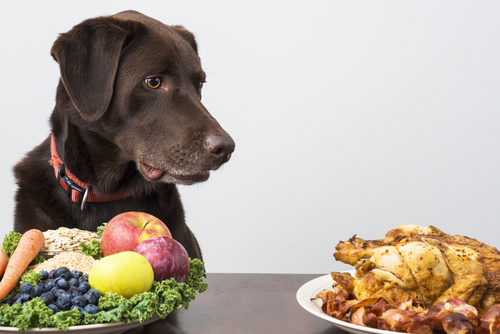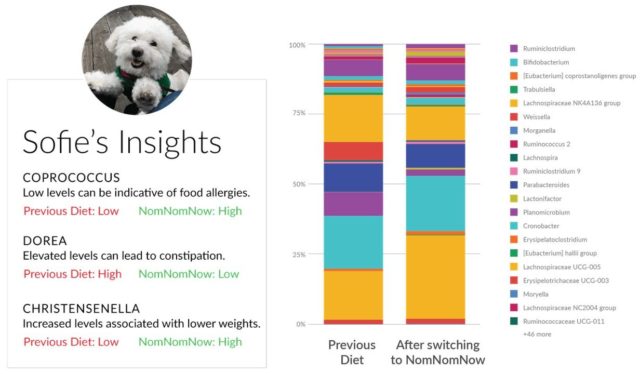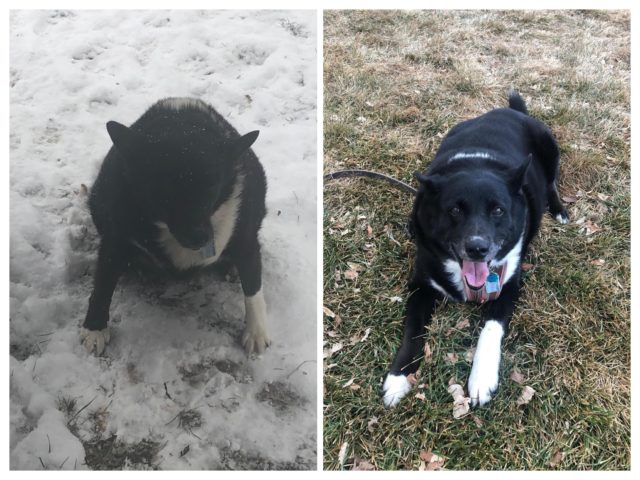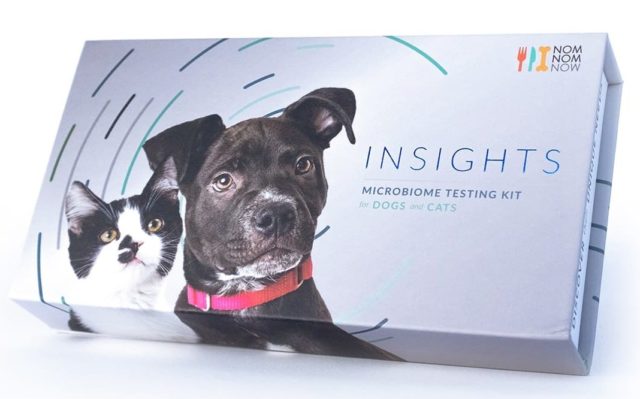
There is a vast army of microorganisms living inside your dog’s digestive system. These microbes convert food into energy, produce vitamins, and fight a never ending battle against germs. Together, the genes of all these microorganisms are known as the gut microbiome.
Using modern sequencing techniques, scientists can “read” these microbial genes and reveal vital information about your dog’s health and dietary needs.

What is the Gut Microbiome?
The term “microbiome” refers to the combined genes of all the microorganisms within a specific habitat. Each species of microorganism has its own unique collection of genes. The microbiome of bacteria, viruses, and other microbes within the gut help our dogs stave off illness and maintain a healthy weight.
However, alongside the healthy microorganisms, the canine digestive system also hosts potentially harmful bacteria. Some leave them susceptible to disease while others affect their ability to digest certain foods.
Understanding the makeup of your dog’s own unique intestinal microbiome gives you a window into their health and allows you to choose the best possible diet for his or her individual needs. Armed with this knowledge, you can tailor your pup’s diet and lifestyle to ensure proper digestion and a healthy immune system.

The Gut Microbiome & Your Dog’s Immunity
Like all living organisms, dogs require nourishment from food to live. They acquire the majority of their nutrients from the breakdown of food by the digestive system. However, dogs cannot digest all of the nutrients from their diet. That’s where the microbiome comes in.
Many animals, including humans and dogs, cannot digest fiber. Still, it offers two major health benefits when included in the diet. First, fiber has a normalizing effect on digestion, slowing down intestinal contractions when a dog has diarrhea, and speeding them up in times of constipation.
Secondly, some fibers contain important vitamins and minerals that can only be extracted by bacteria in the gut. Without the microorganisms contained in your dog’s gut microbiome, he or she would not be able to reap the benefits of healthy fiber.
Many people believe that because dogs are descendants of wolves, they should eat the same way wolves do. However, by analyzing certain genes found in dogs, we have come to learn the nutritional needs of our pets are actually quite different than wild animals. Domestic dogs have genes for the digestion of starch and glucose which wolves – who are entirely carnivorous – do not. This means that like us, dogs are omnivores and should get at least some of their nutrients from vegetation.
Clearly, the diet we feed our dogs has a massive impact on the contents of their gut microbiome and their overall health. As scientists learn more about the canine microbiome, we must adjust the way we feed them to ensure proper nutrition.
The Gut Microbiome & Your Dog’s Digestive Health
Did you know that as much as 70% of your dog’s immune defenses reside within the gut? Ensuring a healthy balance of good bacteria helps your pup battle pathogenic infections as well as inflammation-based diseases such as type 1 diabetes and certain cancers.
The bacteria in your dog’s intestinal microbiome protect against pathogens by competing with them for vital nutrients. Without the nourishment they need to grow, harmful foreign substances cannot thrive. The microbiome also helps prime the immune system, so it is ready and waiting should an invading pathogen come along.
While most research in this area has been conducted on humans, scientists are intrigued by the idea of using diet to improve interactions between the microbiome and immune system of dogs.

The Gut Microbiome & Your Dog’s Weight
According to data from 2017, 60% of cats and 56% of dogs in the United States are overweight or obese. Altering the composition of the gut microbiome through healthy diet can not only help our pups shed extra pounds, but also aid in maintaining a healthy weight thereafter. In fact, research shows the types of bacteria in the gut microbiomes of obese dogs are greatly impacted by switching to a high-protein, low-carbohydrate diet such as NomNomNow.
Luna, an 8-year-old Australian Shepherd/Blue Heeler mix was struggling with her weight until her owner, Corine Miller tried NomNomNow. Within a few weeks, Luna had lost a pound and a half. Her mom also noticed she had more energy and her coat was softer and shinier.
“Once she was strictly on NomNomNow, the weight just started falling off,” Corine says of Luna’s progress. “She’s been on it a couple months and her weight is still going down. Luna weighed 85 pounds when she started in November, and a few months later, she’s already down to 74.”
How the NomNomNow INSIGHTS Microbiome Testing Kit Can Improve Your Dog’s Life
It’s amazing how much a little bit of poop can tell you about your dog’s health! For a limited time, NomNomNow is offering iHeartDogs customers an incredible deal on their INSIGHTS Microbiome Testing Kit for only $59. You can now gain insight into your pup’s gut health and determine their ideal diet!
The first part of the kit involves a series of surveys about your dog’s current diet, eating habits and overall health. Next, the scientists at NomNomNow analyze the bacterial content of your dog’s stool to determine risk factors for numerous conditions such as obesity, inflammatory bowel disease, and even allergies.
By diagnosing imbalances in his or her unique gut microbiome, the report can recommend the perfect dietary options to help resolve issues and maintain overall health.
Check out Sofie’s results:

Ready to order your NomNomNow INSIGHTS Microbiome Testing Kit for only $59? Click here!
The post Let Science Uncover The Secret To Your Dog’s Ideal Diet – In His Poop! appeared first on iHeartDogs.com.


Be the first to comment